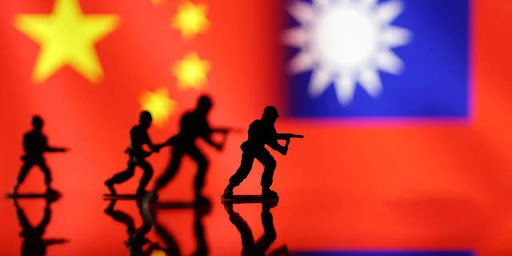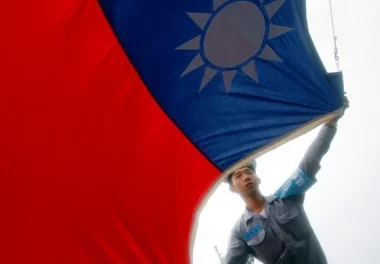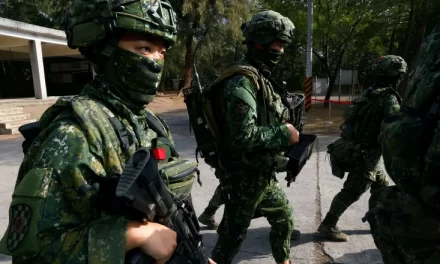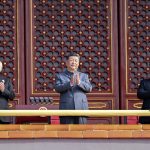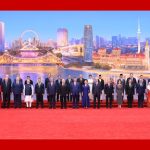By Wu Zuolai
Jul 11, 2024
On June 26, the Chinese Ambassador to France, Lu Shaye, attended the French Diplomatic and United Nations Association seminar on the 60th anniversary of the establishment of diplomatic relations between China and France. In his speech, he said that the current state of partition in Taiwan is a legacy of the Chinese civil war in the 1940s. The problem, he said, is that the civil war in China is not over yet. He even asserted that the Taiwanese Republic of China regime is a rebel regime and that the Chinese Communist regime has the right to take it back at any time.
Lu Shaye made two claims. One is that China’s civil war has not ended, which means that any mainland-regime invasion of Taiwan would be merely a continuation of the civil war. The other is that the regime of the Republic of China is a rebel regime, and the Chinese Communist Party!s (CCP’s) unification of Taiwan is a counter-insurgency.
Lu Shaye should have a basic conceptual understanding of rebellion and civil war: rebellion is local resistance against the central government and undermines the established national order. For example, the Taiping Rebellion and the Boxer Rebellion were both rebel movements. The Comintern established the CCP in China, launched a mutiny, and then established a Soviet republic, a state within a state. This was a typical political and military rebellion. Since the Chinese communist regime directly obeyed the orders of the Communist International (Comintern), the so-called civil war between the Kuomintang and the CCP was essentially a war between the Chinese government and the agents of the international communist movement in China. This was a war parallel to the anti-fascist war by the people of the world — not a civil war, but an international war.
Up to now, the Chinese Communist regime has not changed its beliefs, nor its behavior. The party constitution is above the national constitution. The party organization controls the national administration and even controls civil society. Therefore, the struggle of the Republic of China in Taiwan against the mainland communist regime was not a civil war between the Kuomintang and the CCP, or a civil war between two states. It was a civil war between two self-proclaimed governments, but the mission of the branch of the international communist movement in China to subvert the Republic of China was not completed. By analogy, North Korea did not succeed in overturning the South Korean regime. There, the Soviet Union and the CCP provided assistance and even directly participated in the war. However, United Nations troops successfully repelled the invasion of South Korea by the military forces of North Korea, China and the Soviet Union. This shows that the war between North and South Korea was not a civil war, but an international conflict, an international war.
Thus, the Chinese communist regime’s rule over mainland China is not the choice of the Chinese people, nor is it caused by any so-called tradition or national character. It is the result of events between the two world wars, and the international struggle over communism. It was the Chinese people and the government of the Republic of China who ultimately bore the negative effects of World War II. Mainstream Western society only had consensus about and paid attention to the world war that originated in Europe, but ignored the disastrous consequences of the international communist war for Eastern Europe and Greater East Asia. In addition, during and after World War II, Western countries led by the United States were in conflict with the Soviet Union due to the Cold War. However, the CCP later obtained a legal seat in the United Nations at the expense of the Republic of China. The CCP’s international “legitimacy” is only a certain kind of “reality.” In China, the election process and results of the National People’s Congress and the Chinese People’s Political Consultative Conference are under the leadership and control of the party, and are all conducted under ifs absolute control. The CCP has never gone through true democratic elections, so its legitimacy has not been truly established.
The CCP’s Rationality and Legality
The “Communist Party of China” was a branch of the Comintern established in China in 1921. China’s Jiangxi Soviet was established in 1931. And the Workers’ and Peasants’ Red Armies were all illegal or rebellious in nature. It was not until the Xi’an Incident in 1936 that they were incorporated by the Nationalist Government forces and gained legitimacy. However, after the end of World War II, the CCP, with the support of the Soviet Union, overthrew the already constitutional regime of the Republic of China. To this day, the Chinese communist regime has no constitutional legitimacy. The political mission of the CCP is not to obtain the “liberation” of a country or a nation, nor to establish a modern political power with constitutional democracy. The ultimate goal is to overthrow capitalism and realize communism around the world.
However, it was the CCP’s own party constitution and organization, especially its political kinship with the Soviet Union, that determined that the CCP and the Soviet Union would become a community with a shared future. After the Communist regime betrayed the Nationalist Government after World War II, the “People’s Republic of China” was established through the New Political Consultative Conference just to gain superficial legitimacy. Many initial superficial political structures, like scaffolding, were completely dismantled within five years after the CCP seized control of the mainland: the Political Consultative Conference that had determined the system of the Republic was deconstructed, democratic parties and intellectual elites were comprehensively suppressed, and farmers’ private land and industrial and commercial enterprises’ property were nationalized. The CCP established a one-party autocratic dictatorship, and the people’s sovereign status was stripped.
Rebellion is social unrest caused by a feeling of betrayal. The century-old turmoil in modern China mainly stems from the CCP’s betrayal of the nation, country, and people. The history of the CCP from the establishment of the party, the establishment of its army, and the establishment of the government to the “founding of the country” is a history of rebellion. The CCP regime has gone deviant in China, betrayed the Chinese nation, subverted legitimate political power, and betrayed the Republic of China. The people have no human-rights protection and no constitutional rights. Political freedom has been denied to the Chinese people and the people’s sovereignty has become a one-party dictatorship. Therefore, the CCP has also betrayed the concept of socialism.
This war by the CCP against the Chinese people has continued in the form of movements and struggles since the founding of the country, destroying traditional culture and deviating from universal values. In the CCP’s view it is necessary to shape a new generation of people through the ideas of revolutionary teachers and leaders to achieve socialism and communism. Therefore, the so-called “civil war” between the CCP and the Kuomintang or the Republic of China is only the superficial war, and the CCP’s actual war is against the Chinese people and the civilized world.
Xi Jinping’s “new era” aims to establish a so-called multipolar world, which essentially means redrawing the spheres of influence and replacing the changing of the world order led by the United States and Western countries after World War II, and returning to the state of struggle against the Western world during the Mao era. The change from “hide your strength and bide your time” to “ally with Russia and terrorism” not only supports Russia’s invasion of Ukraine, but also aligns with terrorist organizations and regimes in the Middle East. This is a new international united front that is ready to unify Taiwan at any time and put Greater East Asia and the South China Sea at the forefront. As this regime sees it, the tributary circle of the ancient Chinese empire can be restored. It can be seen that the CCP has moved from a domestic rebellion to an international political rebellion. The CCP regime has replaced the Soviet Union of the Cold War era and has become the core force, and played the leadership role, in the anti-civilized world.
Wu Zuolai is an independent scholar and writer.
This piece was translated from Yibao Chinese. If republished, please be sure to add the source and link https://www.yibao.net/?p=247880&preview=true before the text when reposting.
The author’s point of view does not necessarily represent that of this journal.

